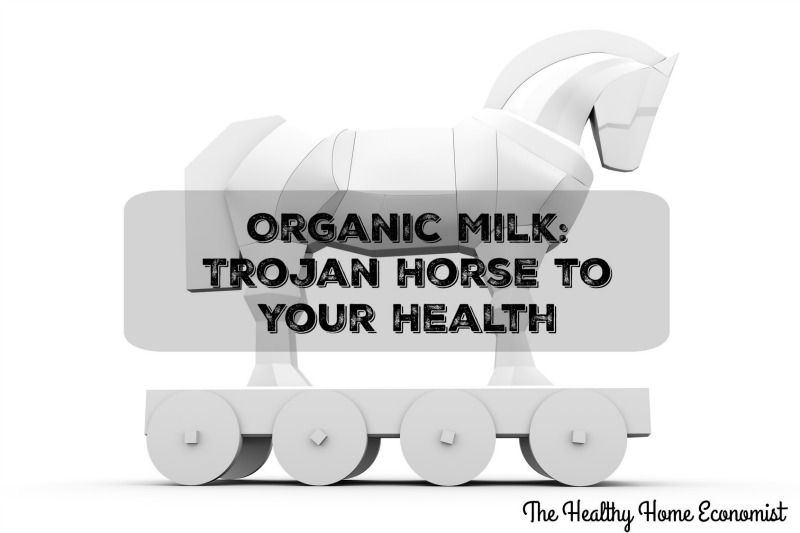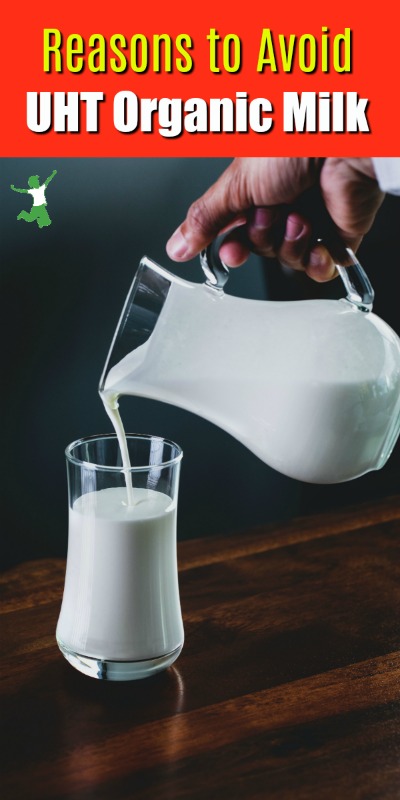Why organic milk that is UHT processed is unhealthy and certainly not a better choice than regular supermarket milk despite the sky-high prices and misleading marketing which leads consumers to believe it is healthy.
Fact: Organic milk companies are pulling the wool over the eyes of the consumer to boost profits.
By marketing their UHT milk as certified USDA Organic, an ever-increasing consumer base willingly buys it. The prices are roughly double the price per gallon of regular, pasteurized store milk. The sad truth is that ultrapasteurized (UHT) organic milk is just as unhealthy as regular, pasteurized store milk.
I’ve often thought if I HAD to choose between them, which milk would I select as being better: regular pasteurized milk from the store or ultrapasteurized organic milk? That’s a toughie. Neither choice is optimal as there is no clear winner.
Both are highly processed milks, both contribute to poor health and chronic illness in general.
Pasteurized Store Milk. Clearly Not Good for You
On the one hand, you have regular, pasteurized store milk that comes from sick, confined cows that are injected with hormones and other drugs. The cows are fed unnatural, GMO, pesticide, and antibiotic laced feed with no access to fresh air or green grass. These poor animals stand on cement floors their entire lives. No surprise that they usually die within about a year and half. Incidentally, the true lifespan for a healthy dairy cow should approach 15 years.
Milk from these confined cows NEEDS to be pasteurized. It is nasty stuff loaded with pus and pathogens because of the filth and chronic mastitis the cows endure.
Ultrapasteurized Organic Milk. Still Bad for You!
On the other hand, you have ultrapasteurized, organic milk. A consumer with only partial knowledge of how milk is processed is easily lured into buying this milk. On the surface, it seems so much healthier. After all, the cows don’t get any antibiotics, steroids or hormones, right? It’s certified USDA Organic. Doesn’t that mean something?
While the cows producing organic milk may not be subjected to the drugs and antibiotics used on conventional dairy operations, the milk coming from an organic-industrial complex is even more highly processed. For example, ultrapasteurized (UHT) organic milk must be subjected to a temperature of 280F for at least 2 seconds.
This compares with standard pasteurization temperature of about 161F. Such a high temperature results in a product that has extended shelf life. UHT milk can remain unrefrigerated for up to 6 months in aseptic packaging.
I find it outrageous that Organic Valley and Horizon frequently display their aseptically packaged, organic dairy in the refrigerated section of the health food store!
Turns out that consumers (particularly those in the US) are much more likely to be duped into buying organic milk if it is displayed in the refrigerated section. Buying organic milk unrefrigerated on the shelf goes against intuition and just doesn’t seem very natural, does it?
Moms buy individually sized aseptic packages of Organic Valley milk and put them in their children’s lunchboxes with ice packs! If they only knew that this milk is so dead that it doesn’t even require refrigeration they might rethink their choice of beverage.
Auto-Immune Disorder Link
Why is ultrapasteurization so bad? The high temperatures used to ultrapasteurize organic milk damage the fragile milk proteins totally and completely. The same thing happens when sweetened condensed milk is manufactured too.
When this happens, the enzymes the body produces to digest these proteins do not work as they no longer “fit together” like puzzle pieces. The undigested proteins then make their way into the bloodstream due to “leaky gut” syndrome, which nearly all Westerners suffer from to some degree. At that point, the body identifies them as foreign proteins and mounts an immune response.
This translates into symptoms better known as allergies, asthma, eczema, and other symptoms of autoimmune disorders! Ultrapasteurized milk is so completely sterilized that sometimes it cannot even be cultured into homemade kefir or yogurt.
This stuff is dead, dead, dead folks.
There is no way that it can be considered healthy even if it is labeled USDA organic.
The enhanced immune response that occurs from drinking ultrapasteurized milk has the potential to lead to milk and dairy allergies pretty quickly. I remember when my first child was nursing, I drank a lot of Organic Valley ultrapasteurized milk.
My son spit up so badly during that time that there was some concern that he had a reflux disorder. Remarkably but not surprisingly, when I stopped drinking the Organic Valley milk, his reflux problem resolved. No treatment was required.
I have no doubt that if I had continued drinking this milk and had weaned my son onto it that he would undoubtedly have a milk allergy today. Fortunately, I wised up in time to get off that poison!
Trading Drug/Pesticide Residues for Estrogen Mimickers
While a consumer may be reducing his/her exposure to antibiotic and pesticide residues by choosing Organic Valley milk, this is by no means a guarantee to less chemical exposure. Processors of organic milk frequently heat the milk to the required 270F AFTER the milk is in the aseptic package or plastic jug! Another option, just as bad, is to fill the package or jug with boiling hot milk that has not yet cooled down!
This releases high levels of endocrine-disrupting phthalates (the notorious BPA as well as several others) used in the packaging into the milk! Most everyone now knows never to heat food in a microwave with plastic wrap on top for this very reason. It’s a shame more people aren’t aware of the tremendous endocrine-disrupting potential of drinking ultrapasteurized, organic milk!
What to Drink Instead of UHT Organic Milk
As you can see, it is an extremely hard decision to pick which milk is more unhealthy: regular pasteurized store milk or ultrapasteurized organic milk.
Better not to have to make the decision at all! Seek out fresh raw grassfed milk straight from the cow (or goat) from a farmer in your local area. And, if you are fortunate enough to have a source for this type of health-giving milk, don’t run out and buy a half-gallon of ultrapasteurized organic milk if you temporarily run out of the fresh from the farm variety. In those situations, it is best to simply go without. The risks from consuming UHT organic milk even on occasion are simply too enormous to ignore.
Another option is to make healthy milk substitutes like this recipe for coconut milk tonic or homemade sprouted oat milk until the next local dairy delivery.

More Information
101 Uses for Raw Soured Milk
Tips for Freezing Milk and other Dairy Products
A1 and A2 Milk: Do Cow Genetics Even Matter?








I love informing the public on the government's lack of caring when it comes to food. Another part of the equation is what the cows are feed. I have been looking into milk products for over 1 year because my son has a high gluten intolerance. The cows in the commercial farms are all grain feed and it seems as if those grains are getting into the milk making him sick. Almost 1 out of 100 Americans have a gluten intolerance and don't know it. The gluten intolerance leads to the leaky gut unless they are allergic to the milk itself from the start. Certified organic milk only needs to be 10% grass feed which in turn causes a problem that there is no regulation on how much grain the cows get leading to gluten in the milk making it unhealthy.
That being said my son is highly intolerant to all grains and the only milk he can tolerate is Horizon 2% from our local market because their processing and feeding seem to be totally grain free.
One final comment is I am not sure what you mean by aseptic containers since the word aseptic means to be germ and contaminate free. I am sure the local farmer cleans his containers by placing boiling water in and around them 100 °C (212 °F) which in Fahrenheit is only a few degrees shy of what you said the pasteurization process is.
Hi Sam, you can test the deadness of ultrapasteurized milk in your own kitchen. Try culturing it into yogurt with a basic yogurt machine. It doesn't work. If the beneficial cultures in yogurt starter can't do anything with the ultrapasteurized milk to ferment it into yogurt then your body most certainly can't digest it either.
I don’t disagree with you that farm fresh is the way to go, but that’s not an option where I live and I make yogurt with organic ultra-pasteurized milk all the time and it turns out great.
Hi Sarah! I too loved your article, but I would like hard facts. You wrote that our bodies have a hard time with the proteins in the ultra pasteurized milk. Do you have a link to any studies for that? Where did you get this information?
This is my first time reading your blog and I find this post very interesting and disappointing since my toddler loves his milk.
We use Meyenberg Goats Milk so taking this away from my 2 year old who drinks two bottles a day will be tough. However it is ultra pasteurized. Would you provide links to research and studies that have shown that pasteurization renders foods dead and has adverse health effects? It seems to make sense but I'd like to read up on this myself to get fully education in my choices for my family. It's such a complex info landscape out here in blog-world. Thank you!
Yes, yes, yes, Danielle. What you are buying from the farm is infinitely better than Horizon. Probably your farmer is low temp pasteurizing (vat pasteurizing) which is much less damaging to the fragile milk proteins than even regular pasteurization.
Hi there, this is my first time reading your blogs
We buy milk from a local dairy that is pasturized but not homogonized grassfed cows. It's not "certified" organic b/c the people that run the place said the process the government make you go through to get "certified" is long and expensive. The cows graze – you can see them when you drive to the dairy and the milk is in glass bottles. Even my husband, a skepic of "natural" "organic", etc said it's the best milk he's tasted in years – since childhood.
We drink the 1 1/2% variety, mainly b/c I cannot stomach whole milk. Is that better than the Horion brand from the store?
Hi Sarah, how do you make yogurt at home using raw milk? I have a little yogurt maker… Thanks!
If ultrapasteurized is the only thing you can get, then yes, it is better to not drink milk! Do you have a healthfood store in your area? Then, ask them to start stocking Natural by Nature low temp pasteurized, nonhomogenized grassfed whole milk. You can also mail order Organic Pastures raw milk from CA. It is quite pricey, to do this, so it would be best to get your local healthfood store to stock a decent alternative.
Ultra Pasturized is the ONLY option we have in this area. I was one of those who bought Horizons and Organic Valley because they were "organic". I guess I'll just quit buying milk . . . Not sure what else to do.
Trader Joe's organic milk is not ultrapasteurized, and I think same can be said of Whole Food's milk. Thank you for your post! It explains why I have problems every time I run out of milk and use the parmalat I keep in cupboard as backup (no longer). Very useful information.
That is great to know that some Organic Valley milk is regular pasteurized now. Perhaps the company is responding to consumer pressure? One can always hope! Thanks for sharing this information.